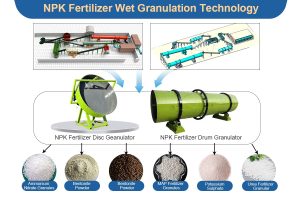The investment in a complete NPK fertilizer granulating machine always raises questions about cost, efficiency, and plant setup planning. Fertilizer manufacturers and entrepreneurs focus not only on the initial fertilizer manufacturing plant cost but also on the long-term benefits of reliable granulation equipment. A compound fertilizer production plant involves several processing machines, each contributing to the overall compound fertilizer plant cost. To clarify this topic, the following discussion explains the suitable raw materials, the machine features, and the factors influencing the total npk fertilizer production plant cost.
What Raw Materials Can a Complete NPK or Compound Fertilizer Production Line Process?
A complete npk fertilizer granulation line allows the use of diverse raw materials, and this flexibility directly affects fertilizer plant setup cost. Urea, ammonium chloride, ammonium sulfate, potassium chloride, and monoammonium phosphate represent common nitrogen, phosphorus, and potassium sources. In addition, calcium carbonate, dolomite powder, and bentonite often function as additives or fillers to improve granule quality. When investors consider npk fertilizer factory cost, they also evaluate material adaptability because the choice of raw materials influences process efficiency, granule hardness, and final nutrient balance.
The npk fertilizer pellet making procedure usually begins with batching equipment that measures each component accurately. Crushing machines then reduce large particles or lumps, while mixing systems homogenize the powder before granulation. With proper preparation, the raw material combination forms uniform compound fertilizer granules through disc granulators, drum granulators, or double roller extrusion granulators. This raw material versatility gives manufacturers control over product formulas and ensures that the npk fertilizer production plant cost generates long-term returns.

What Features Define an Efficient NPK Fertilizer Granulating Machine?
A key part of compound fertilizer manufacturing is the choice of granulation equipment. Each fertilizer granulator machine type offers different advantages, and these differences influence fertilizer production line cost. A disc granulator provides simple operation and low investment, suitable for small-scale fertilizer factory setup cost. A rotary drum granulator ensures large capacity and continuous pelletizing, which suits medium to large npk fertilizer manufacturing plant cost planning. A double roller extrusion granulator reduces drying needs, which lowers energy consumption and total fertilizer production plant cost.
Besides the main granulator, other supporting fertilizer machinery also affects financial planning. A rotary drying machine and cooling machine maintain granule strength and quality while controlling moisture content. A screening machine separates qualified npk fertilizer pellets from powder or oversized particles, and a packing machine improves labor efficiency by completing automatic bagging. The integration of these machines defines the overall npk fertilizer production cost structure. Investors gain clear benefits when they select durable equipment because production stability reduces long-term compound fertilizer plant cost.
How Does Fertilizer Plant Cost Influence Business Decisions?
The fertilizer plant setup cost includes equipment purchase, installation, land use, energy supply, and labor. An investor who analyzes npk fertilizer factory cost needs to balance initial expenses with potential output capacity. A small production scale with limited fertilizer machinery requires lower fertilizer manufacturing plant cost, but it may reduce efficiency. A medium or large compound fertilizer production plant cost demands higher investment, yet it provides stable supply, better granule uniformity, and stronger market competitiveness.
In market practice, buyers often compare npk fertilizer granulator machine suppliers. Trusted equipment manufacturers usually provide not only machinery but also complete technical guidance for fertilizer granulation procedure. Cost-effective npk fertilizer production lines help reduce operational risks and ensure consistent compound fertilizer pellet quality. When investors calculate total npk fertilizer plant cost, they should consider after-sales service, spare parts supply, and equipment durability to secure long-term profitability.
Conclusion
The cost of a complete npk fertilizer granulating machine depends on raw material choice, machine features, supporting equipment, and plant scale. By selecting suitable raw materials like urea, ammonium sulfate, and potassium chloride, by evaluating granulation machinery such as disc granulators or drum granulators, and by considering auxiliary units like dryers, coolers, and packers, investors can calculate the fertilizer manufacturing plant cost more accurately.
Fertilizer entrepreneurs who aim for efficient npk fertilizer pellet production need to view cost not only as expenditure but also as investment in quality, efficiency, and market advantage. For those searching for reliable compound fertilizer production machinery, a professional fertilizer equipment manufacturer such as Yushunxin offers practical solutions and competitive fertilizer plant cost planning. You can visit: https://www.fertilizerproductequipment.com/npk-fetilizer-plant-cost/